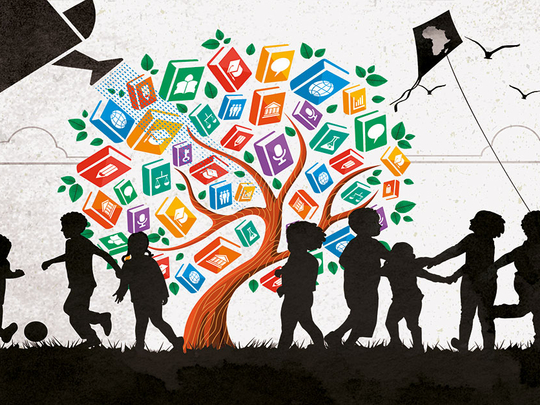
Germany’s goal for the G20 meeting in Hamburg is to make globalisation work for everybody. World leaders will discuss how to achieve sustainable growth in Africa, women’s economic empowerment and how to create more jobs for a rapidly growing youth population. Investment and infrastructure are the buzzwords of the day.
It’s an excellent mission, and one I support wholeheartedly, but there is a serious gap in the agenda, which is investment in education. Without better teaching and learning outcomes for all children, it is hard to see how the G20’s agenda can be realised.
Such is the learning crisis that, in low-income countries across sub-Saharan Africa, only one in 10 children will gain basic secondary school skills by 2030 – the target year for achievement of the UN-agreed sustainable development goals. The vast majority, nine in 10 children, will barely complete primary school. Even in middle-income countries, home to the largest populations, only half of young people are likely to attain minimum secondary school results by 2030.
At the same time, billions of low-skilled jobs will be lost to automation all over the world, and employers will require significantly higher skills from prospective employees. And in an uncertain world, we also know that educated populations are more resilient and able to recover. Literacy and the ability to seek out and act on information are critical to rebuilding communities affected by conflict, climate change and natural disasters.
Without increased investment in quality education for all, the G20 agenda is on shaky ground. Economic growth driven by large-scale infrastructure investments without equitable provision of education will leave hundreds of millions of people behind, exacerbating inequality, disillusion and instability. Yet investment in education aid by key donors is falling. Recent analysis by Unesco’s Global Education Monitoring Report says education’s share of global aid has fallen for six years running even though total aid has grown by 24 per cent over the same period and aid is not going to the countries and children most in need. In fact, aid for education in Africa is down substantially.
If G20 leaders are serious about sustainable growth and job creation, and want to stem migration flows and promote long-term stability, education is an essential investment. But this has to be equitable investment which means ensuring the poorest have the same opportunities to learn as the privileged, girls are supported to stay in school, and disabled and excluded children are served by a functioning, inclusive education system, for which government is accountable.
A literate, skilled workforce is essential for low-income countries to attract investment and fill jobs with local rather than imported labour. Middle income countries need to attend to the education of their poorest people to build their economies and ensure long-term stability. Wealthy countries have an interest in building stable and prosperous partners for a sustainable future.
I do believe this is education’s time. I was delighted that pop music icon Rihanna, who is also the Global Partnership for Educations’ global ambassador, tweeted a number of world leaders at the weekend – calling on them to #FundEducation.
Rihanna’s tweets created quite a storm and community activist organisation Global Citizen will be on the case with a big concert in Hamburg in a few days time, on the eve of the G20 summit. Along with many others including Shakira, Canada’s Justin Trudeau and Norway’s prime minister Erna Solberg, I will be on stage – not singing I assure you – but urging donors and developing countries alike to fund education, particularly through the Global Partnership for Education’s replenishment early next year which asks donors for $3.1bn for 2018 to 2020. Let’s hope the G20 are listening, not only to each other, but to Rihanna and the millions of young people whose skills and talents must be nurtured through a major increase in investment in learning.
— Guardian News & Media Ltd
Julia Gillard is currently Chair of the Board of the Global Partnership for Education which mobilises global and national efforts to achieve quality education for all.










